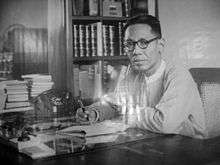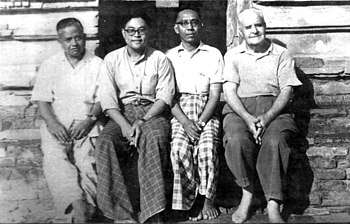Min Thu Wun
Thiri Pyanchi Min Thu Wun (Burmese: မင်းသုဝဏ်; 10 February 1909 – 15 August 2004) was a Burmese poet, writer and scholar who helped launch a new age literary movement called Khit-San (Testing the Times) in Burma.[2][3] He is the father of Htin Kyaw, president of Myanmar from 2016 to 2018.
Min Thu Wun | |
|---|---|
မင်းသုဝဏ် | |
 | |
| Member-elect of the Burmese House of Representatives for Kamayut Township | |
| Majority | 23,345 (76%)[1] |
| Preceded by | Constituency established |
| Succeeded by | Constituency abolished |
| Personal details | |
| Born | Wun 10 February 1909 Kungyangon, Hinthada District, Hanthawaddy Division, British Burma |
| Died | 15 August 2004 (aged 95) Kamayut Township, Yangon, Myanmar |
| Nationality | Burmese |
| Political party | National League for Democracy |
| Spouse(s) | Kyi Kyi |
| Children | Htin Kyaw |
| Parents | Lwan Pin Mi |
| Alma mater | Rangoon University Oxford University |
| Occupation | Writer |
Distinguished career

Born Maung Wun at Kungyangon in Mon state in 1909, he was of Mon and Bamar (Burman) descent. He started writing poems at the age of 20 for Rangoon College (later Rangoon University) magazine. It was in university that he, along with the other students of Professor Pe Maung Tin – Theippan Maung Wa and Zawgyi, pioneered the Hkit san style of short stories and poems, published in the university magazine, and Ganda Lawka (World of Books) magazine which he edited, under the tutelage of J S Furnivall, founder of the Burma Research Society.[2][4][5] The year 1934 saw the publication of Hkit san pon byin (Experimental Tales) – a collection of short stories to test the readers' reaction, written by Zawgyi, Min Thu Wun and Theippan Maung Wa among others. The writing was distinct and novel in style using shorter sentences and moving away from the traditional literary vocabulary.[5]
In 1935 Min Thu Wun received his master's degree in Burmese literature. He went to study at Oxford University, and achieved a bachelor's degree in literature in 1939.[2]
Whilst Theippan Maung Wa was famous for his prose, Min Thu Wun and Zawgyi were best known for their portrayal of the daily lives of ordinary people and for their appreciation of nature in their poems.[4] Zawgyi became the most respected literary critic, and Min Thu Wun the best loved poet.[5]
Publications
- Nursery Songs for Maung Khway – 13 songs in Burmese with music and English translations by Gordon H Luce of 60 years ago were reprinted in 2002.[6]
- Stories for Children – his translation of 26 stories for children from around the world from 1955 to 1961 were also collected into a book in 1965.[7]
Min Thu Wun's prolific writings on literature, both classical and modern, in numerous articles were later collected into 3 important books.
- Pan hnin pinzi – The Tree Trunk and the Blooms (1965)
- Myanma sa Myanma hmu – Burmese Life and Letters (1965)
- Pyinma ngokto – The Tough Tree Stump (1968)[5]
Min Thu Wun explained in a book review the nature of "light" and "serious" literature.[3] He went on to create the Burmese version of Braille for the blind.[4] He also helped compile Mon – Burmese and Pali – Burmese dictionaries.[2]
Politics
In 1990 he was elected as a National League for Democracy (NLD) Member of Parliament, although he resigned 8 years later under pressure from the military regime. His work has also been banned from publication.[2] A popular publication called Sapei Gya-ne (Literary Journal) was also blocked in its attempt to dedicate its June 1995 issue to Min Thu Wun.[8] He died on 15 August 2004 at the age of 95.[2]
See also
- Literature of Burma
Notes
- "National League for Democracy". Brief Biographies of Elected MPs. Retrieved 7 April 2012.
- Aung Lwin Oo. "Burmese Literary Pioneer Dies". The Irrawaddy 16 August 2004. Archived from the original on 12 August 2010. Retrieved 30 November 2008.
- Maung Swan Yi (December 2002). ""Chewing the West":The Development of Modern Burmese Literature under the Influence of Western Literature" (PDF). p. 5. Archived from the original (PDF) on 11 April 2008. Retrieved 30 November 2008.
- Min Zin. "Living History: Dagon Taya & Modern Burmese Literature". The Irrawaddy July 2000. Archived from the original on 13 October 2007. Retrieved 30 November 2008. Cite journal requires
|journal=(help) - Kratz, E Ulrich (1996). Southeast Asian Languages and Literatures. I B Tauris. pp. 18, 21. ISBN 978-1-86064-114-5. Retrieved 2 December 2008.
- Min Thu Wun. "Nursery Songs for Maung Khway" (PDF). Sapei Lawka (World of Letters), NDD. Archived from the original (PDF) on 13 May 2011. Retrieved 2 December 2008.
- Min Thu Wun. "Stories for Children" (PDF). Sapei Lawka (World of Letters), NDD. Retrieved 2 December 2008.
- Yozo Yokota. "Report on the situation of human rights in Myanmar – D:Freedom of expression". UN Commission on Human Rights, 5 February 1996. Archived from the original on 29 April 2011. Retrieved 3 December 2008.
External links
- official website
- Rose (1932) p38, The Pyima Stump, (1949) p41 Poems translated by Dragan Janikovic
- Let's Go A-gathering Thabye Plums Poems translated by Hla Myo Nwe
- Poems by Min Thu Wun English translation by Dr Maung Maung Nyo
- Sayagyi Min Thu Wun Centenary old photos in Burma Digest
- Myanmar sa Myanmar hmu (Burmese Literature and Culture) Min Thu Wun, in Burmese, Scribd
- NLD party youth marked Min Thu Wun 100 Year Anniversary MoeMaKa Radio & Multimedia